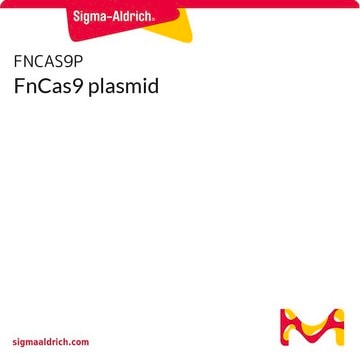Recommended Products
recombinant
expressed in E. coli
Quality Level
packaging
vial of 50 μL
concentration
20 ng/μL in TE buffer; DNA (1μg of plasmid DNA)
Promoter
Promoter name: CMV
selection
kanamycin
shipped in
dry ice
storage temp.
−20°C
Looking for similar products? Visit Product Comparison Guide
General description
The Cas9 expression plasmids use the CMV promoter for strong transient expression of Cas9. Alternate promoters can be substituted by replacement of CMV using MluI and NheI. Also, the Cas9 expression plasmids can be linearized using XbaI for T7-based mRNA production.
Application
Functional Genomics/Target Validation
- Creation of gene knockouts in multiple cell lines
- Complete knockout of genes not amenable to RNAi
- Creation of knock-in cell lines with promoters, fusion tags or reporters integrated into endogenous genes
Components
1 vial containing 1ug of Cas9 plasmid.
Please note, product does not contain guideRNA sequence. This must be purchased separately through the Custom CRISPR product tab.
Please note, product does not contain guideRNA sequence. This must be purchased separately through the Custom CRISPR product tab.
Principle
CRISPR/Cas systems are employed by bacteria and archaea as a defense against invading viruses and plasmids. Recently, the type II CRISPR/Cas system from the bacterium Streptococcus pyogenes has been engineered to function in eukaryotic systems using two molecular components: a single Cas9 protein and a non-coding guide RNA (gRNA). The Cas9 endonuclease can be programmed with a single gRNA, directing a DNA double-strand break (DSB) at a desired genomic location. Similar to DSBs induced by zinc finger nucleases (ZFNs), the cell then activates endogenous DNA repair processes, either non-homologous end joining (NHEJ) or homology-directed repair (HDR), to heal the targeted DSB.
Physical form
Sigma Cas9 plasmid DNA is supplied at concentrations of 20ng/ul in 50ul.
Preparation Note
Sigma CRISPR plasmid products are delivered as mini-prep aliquots, which may not be suitable for transfection into particular cell types. For best results, we advise maxi-prepping plasmids using endotoxin-free DNA purification kits prior to transfection.
Other Notes
Must be used in conjunction with a U6-gRNA plasmid in order to mediate a double strand break in the DNA.
Typical transfection concentrations used in literature are in the ranges of >= 1.0 ug/uL and <= 5 uL of Cas9 plasmid combined with >= 1.0 ug/uL and <= 5 uL of U6-gRNA plasmids. (All dosages above assume 0.5 to 1 million cells nucleofected)
Typical transfection concentrations used in literature are in the ranges of >= 1.0 ug/uL and <= 5 uL of Cas9 plasmid combined with >= 1.0 ug/uL and <= 5 uL of U6-gRNA plasmids. (All dosages above assume 0.5 to 1 million cells nucleofected)
Legal Information
Storage Class Code
10 - Combustible liquids
Flash Point(F)
Not applicable
Flash Point(C)
Not applicable
Certificates of Analysis (COA)
Search for Certificates of Analysis (COA) by entering the products Lot/Batch Number. Lot and Batch Numbers can be found on a product’s label following the words ‘Lot’ or ‘Batch’.
Already Own This Product?
Find documentation for the products that you have recently purchased in the Document Library.
Customers Also Viewed
Yan Wang et al.
Reproduction (Cambridge, England), 160(3), 353-365 (2020-06-11)
In this study, we investigated a gene-edited (Zp2MT/MT) rat model of infertility caused by the failure to express the zona pellucida glycoprotein 2 (ZP2) due to the significant reduction of mRNA amount. We examined the defects in the zona pellucida
Our team of scientists has experience in all areas of research including Life Science, Material Science, Chemical Synthesis, Chromatography, Analytical and many others.
Contact Technical Service

















